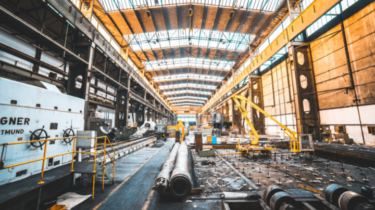Transitioning towards a clean, green and circular future
Examining the socioeconomic effects of decarbonisation investments in the steel industry and the impact these can have on the national economy.
Download PDF
Background
Steel plays a key part in the modern world, serving as a vital component of manufacturing activities and as an essential material used in every aspect of our lives; from cars and refrigerators to cargo ships and surgical scalpels. However, with growing pressure for the steel industry to decarbonise to meet national and EU emissions targets, European-based businesses operating in this sector face the prospect of either reaching sustainability targets or ending production.

The Challenge
With climate change looming and geopolitical tensions rising, Tata Steel Netherlands, one of Europe’s leading integrated steel producers, is looking for ways to navigate a tumultuous environment. The company commissioned Oxford Economics to analyse its socioeconomic impact on the Dutch economy to understand how it already supports GVA, employment and tax income in the basic metals industry and across a wide range of other sectors.
Moreover, to remain a key employer in the Netherlands, Tata Steel is planning to make significant investments in clean, green and circular steel technologies and processes to transform its production site at IJmuiden. It asked us to quantify the impact these investments in its transition to green steel could have on the country’s future economy.

The Solution
Our Global Sustainability Model (GSM) is a unique tool that allows us to trace an organisation’s entire supply chain and associated consumer spending across countries and industries. Moreover, as money goes in and out of an economy through multiple supply chains, we can demonstrate the “multiplier effect” for a given spend impetus, showcasing the overall impact one company can have on an economy.
Using the GSM, we accurately quantified Tata Steel’s full economic contribution to the Dutch economy in 2022 by measuring not just its direct activities but also those of its supply chain and related wage-financed consumer spending – the indirect and induced impacts. In addition, we estimated the positive future boost to the Dutch economy of Tata Steel’s green steel investments.

The Result
With our evidence-based modelling, our client was able to showcase how the decarbonisation of its steel production will result in a more localised supply chain, thereby boosting jobs, GVA and tax revenue in the Netherlands and contributing to resilient supply chains. By understanding the socioeconomic next to the environmental effects of its transition plans, Tata Steel was able to demonstrate how its investments supported Dutch and European policy goals.
Ultimately, the results from our report contributed to the discussions in The Netherlands on Tata Steel’s green investment. Moreover, by illustrating how its transition towards becoming a clean, green and and circular company has direct socioeconomic benefits, Tata Steel has been able to reconfirm itself as a sustainable leader within its field.
Contact Us
If you would like to learn more about our economic impact services, please fill in the form and let us know a bit more about you and what you’re looking for. A member of the team will be in touch with you as soon as possible.
By submitting this form you agree to be contacted by Oxford Economics about its products and services. We will never share your details with third parties, and you can unsubscribe at any time.
Related Services

Economic Impact
Quantifying the economic, social, and environmental impact of government policies, new investments, technological innovations, industries, and companies at a global, national, or local level.
Find Out More
Thought Leadership
High-impact, evidence-based narratives to help executives run their organisations more sustainably and profitably.
Find Out More
Industry Consulting
Translate what the broader questions around key economic and sector trends, risk, technology disruptors, as well as policy and regulatory changes mean for your organisation.
Find Out More
Bespoke Forecasting and Scenarios
Supporting strategy, policy, and risk appraisal with quantitative analysis tailored to your organisation.
Find Out More